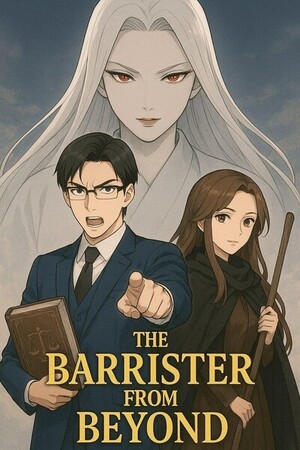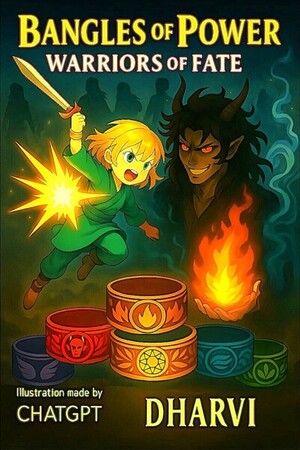Chapter 35:
Case Closed
The Barrister From Beyond
I snapped back to the cold reality of Kaisergrad. The faint light of dawn was just beginning to touch the highest peaks of the Mittengrad towers. My heart was pounding, the sharp rush of legal victory momentarily replacing the fear of my current confinement. The stone of the window frame was rough against my palm, a stark difference from the smooth wood of the courtroom railing.
"Fredreich is doing the same thing," I realized, the memory sharpening my focus. The parallels were absolute. "He is counting on the sweeping emotional effect of his demands, the price of peace, the chaos we caused. He's relying on his rhetoric, the drama of the 'Avenger King,' to mask the inherent lie of his position."
Fredreich had made his opening statement. It was a demand for surrender dressed as a peace treaty, successfully painting Ur as the "cause of chaos." He demanded control of the Blutklamm trade route and the establishment of a garrison there, effectively seeking to starve half of Ur into submission while maintaining a strategic foothold for invasion. In doing so, he revealed his weakness. He had to commit a substantial part of his force, the Third Royal Legion, to capture and hold those key mountain passes. He was so blinded by his need to look strong and decisive, to fulfill his predetermined narrative, that he couldn't see the tactical trap he was walking into.
The true moment of clarity, the final piece of evidence that sealed my resolve, lay in the memory of the past.
The courtroom was silent, the air heavy with expectation, much like the throne room after Fredreich delivered his ultimatum. Masami Hirano, the defense attorney, had delivered his closing argument. It was a masterpiece of rhetoric, weaving Takeda’s alibi into a seamless narrative of innocence and suggesting the victim was misled by trauma. He presented a narrative so compelling that the jury visibly swayed with every word.
Then it was my turn. I didn't yell or appeal to emotion. I didn't even mention the victim's name. I walked slowly to the digital projector and showed the jury a map of the two-kilometer route between the crime scene and the Izakaya Yume.
“The defense asks you to believe that Shigeru Takeda took twenty minutes to compose himself after a stressful day,” I said, my voice quiet, cutting through the silence. “A beautiful, human detail designed to earn your empathy, designed to explain a critical gap in time.”
I then displayed the konbini footage, freezing it on the frame of Takeda at the counter. The image was grainy, mundane, and utterly damning.
“But Shigeru Takeda did not spend twenty minutes composing himself. He spent twenty minutes covering his tracks. This sixty-second transaction, caught on a cheap camera four blocks away, is the unmovable truth that shatters the defense’s elegant lie. A man who stops to calmly compose himself does not sprint down a city street to purchase mints with cash before continuing his journey.”
I argued that the lie itself was the evidence. I argued that Takeda was guilty not just of the crime, but of using the law’s caution to inflict cruelty upon a vulnerable person. I focused relentlessly on the discrepancy between the defense's alibi narrative and the physical evidence of Takeda's frantic actions.
The jury returned a verdict of Guilty. The relief that swept through the court was immense, but for me, it was immediately replaced by a profound, cold emptiness.
I gripped the window frame in Kaisergrad, the memory of that verdict still sharp. I had won the battle, but I had immediately understood I had lost the war. Takeda was convicted, but the system remained fundamentally broken. The societal pressure, the media attacks on the victim, the arrogant confidence of men like Hirano, it all still stood, ready to crush the next person who sought justice. That victory, which should have been everything, felt like nothing more than a temporary bandage on a systemic wound. It was then, standing in the silence of the courtroom after the crowds had left, that I realized to enact true justice, I had to leave the corrupt legal system behind entirely. I had to find a new field where logic and truth could actually change the world, not just win a single case.
Now, I faced Fredreich, a man who saw the world as his personal courtroom and demanded a verdict of surrender. He had presented his final demand.
“Fredreich forgets that I still have the konbini footage I need to acquit him,” I vowed, “his justification for a war against Ur rests on the attack near Blutklamm mountains.”
"The real flaw is his reason for war," I thought, the strategy crystallizing. "He needs the world, and his own people, to believe he is the righteous defender. But that attack was too convenient, too perfectly timed to coincide with his demands, and I’ll prove it.”
My plan now rested on proving that Fredreich’s casus belli was nothing more than a fabrication. For that I needed evidence that refuted his claims of Urian involvement. If I could convince Fredreich’s own court of public opinion that the attack wasn’t from Ur, or even that he may be behind it, the war would lose its political foundation and collapse before the first major battle.
I put on my clothes as quickly as I could, the day still young as the light now started to seep in through the windows. Every moment spent in Kaisergrad was a moment Fredreich gained to tighten his military noose. I immediately made my exit from the room, moving swiftly and quietly through the stone hallways toward Jaeger’s room.
I knocked but got no reply. I knocked again, this time more rapidly, to be met with the sound of groaning coming from the other side. Realizing I had little time to spare, I barged into the room, where I found a rather large Jaeger sleeping on a bed that was clearly too small for him. He was sprawled awkwardly across the mattress, his head near the footboard and his feet dangling off the side.
“Wake up, Jaeger,” I nudged him slightly. “We have lots to do.”
“Huh?” Jaeger shot right up, causing the bed underneath him to crack loudly, the sound echoing in the small chamber. “What’s wrong?”
“Jaeger, wake up, look at me.” I grabbed his face and smacked it ever so slightly, the gesture familiar from our time in Ur. “I need you to do something for me, now.”
“Yes, yes, I’m up!” Jaeger forced my hands off his face. “What’s wrong?”
“Send a letter to Faelar immediately, using the fastest courier we have. Ask him to dispatch a small, silent team of his most trusted men or spies to the last watchtower that was attacked near the Blutklamm range,” my voice was desperate, yet slow and controlled. “They must find any evidence that disproves Fredreich’s claim. Any trace of non-Urian involvement, or a sign that the fire magic used was a royal Mittengrad signature.”
“Do you know where the watchtower is?” Jaeger yawned as he stretched an arm upwards, hitting the chandelier that hung from the ceiling with a dull clang.
“No, but I’m certain Faelar does. He’s the commander. Tell him this entire war may not see any blood being shed at all if he can find this one piece of evidence.” I walked back out of the room, leaving Jaeger with this set of instructions, the clock on Fredreich’s war having officially started. The only path to peace now lay in espionage and the power of truth.




Please sign in to leave a comment.